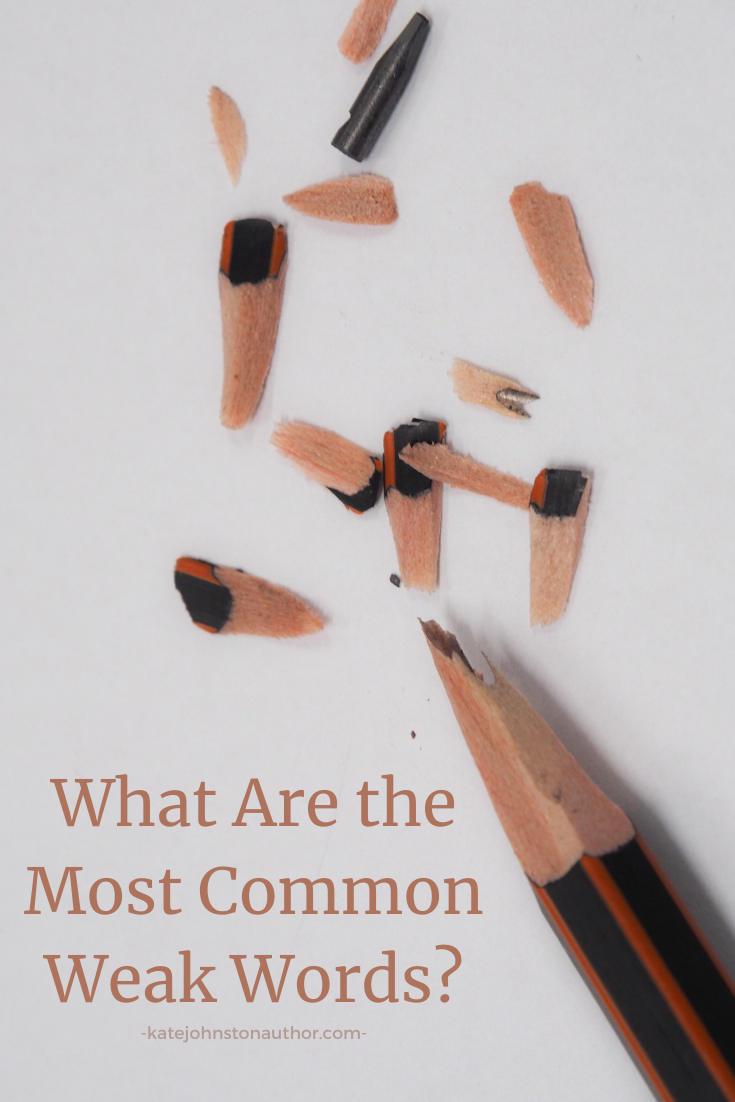What Are the Most Common Weak Words?
Weak words are a story’s nemesis. They are easy to use, serve multiple purposes, and act as quick fillers--but they drag your story down and dim your writing. They crop up like kittens unless we are paying strict attention to each sentence we compose. If you're concerned with the popular guideline of "Show, don't Tell," then you need to pay attention to the sentence at word-level of your writing. Weak words in your prose will negate any kind of emotional engagement you're trying to make with your readers.
In this article, I'll give you a rundown of the most common weak words and why they aren't good choices for your writing. With care and time, you can ferret them out—my advice is to wait until you’re at the copyediting stage, when there is no chance of you rewriting and accidentally adding in more of these insidious words. When you edit, replace those offenders with strong verbs or simply tighten the sentence.
“TO BE” VERBS
Present Form
I am
You are
He/She/It is
We are
You are
They are
Past Form
I was
You were
He/She/It was
We were
You were
They were
Perfect Form (past participle)
I have been
Progressive form (present participle)
I am being
PRONOUNS
Personal pronouns: I, you, he, she, it, we, they
Demonstrative pronouns: this, that, these, those
Possessive pronouns: mine, yours, his, hers, its, ours, theirs
Relative pronouns: that, which, who, whom, what, whose
In our effort to avoid repeating a noun throughout a paragraph, we’ll use a pronoun—a logical choice, but hazardous. Check your paragraphs to see how often any pronoun is “echoed.” Replace the repeated pronouns with either a synonym of the noun or with active verbs.
IT AND THERE
Eek. These buggers sneak in all the time! “It” and “There” can be used like pronouns when the rules of grammar require a subject but no noun is actually being referred to. Both are usually used at the beginning of a sentence or clause, as in "It was almost game time" and "There is a deer in the backyard." Cut these bad boys and rewrite the sentences for more zing: “One more hour till game time.” “I see a deer grazing in the backyard.”
ADVERBS
“I believe the road to hell is paved with adverbs, and I will shout it from the rooftops. To put it another way, they're like dandelions. If you have one on your lawn, it looks pretty and unique. If you fail to root it out, however, you find five the next day... fifty the day after that... and then, my brothers and sisters, your lawn is totally, completely, and profligately covered with dandelions. By then you see them for the weeds they really are, but by then it's—GASP!!—too late.”
Stephen King – On Writing
Some examples of adverbs: very, quickly, suddenly, silently, just, now, well, badly, really, soon, happily, briefly, unfortunately, much, otherwise, after, before, never, down, in, outside, totally, completely…
The above is a small list of adverbs that most editors will tell you to cut. They aren’t needed in your writing to get the message across, plus they’re vague. A better decision is to switch out the adverb for a strong action verb.
PREPOSITIONS
Words that show the relationship between a noun and a pronoun and some other word or element in the rest of the sentence. These words are easy to repeat because they are so useful, creating the dreaded “echo” in your writing.
Some examples of prepositions: about, except, beside, but, down, concerning, far from, for, from, into, like, onto, since, than, towards, until, up, with…
Again, this is an abbreviated list, but they are highly common in our writing. Strike them when possible and rewrite the sentence to tighten and clarify.
ADJECTIVES
This is tricky, because adjectives are necessary for detail and description. Some adjectives are better than others, like ice cream. I won't choose vanilla if Mississippi Mud is an option.
Adjectives are weak when they are gradable. They alone do not tell us how cold or good something is. "Cold" could mean below zero degrees, but it can also be cold when the temperature is fifty degrees higher. Especially if you're a Texan.
On the other hand, "freezing" is not a gradable adjective because it is precise. And that's when Texans scurry for cover.
A mistake writers make to "strengthen" their adjectives is to add very, really, or so. Dump those combos for an oomphier adjective:
Very nice --->---> Marvelous
Really hot-->--> Scorching
So pretty-->--> Exquisite
Some examples of weak adjectives: Happy, good, nice, just, cold, bad, very [...], really [...], so [...], hot, funny, surprising, hungry, tired…
With adjectives, go vivid, go evocative, go precise.
CRUTCH WORDS
These are your personal go-to words that litter your writing without you even knowing it. Likely, you use these words in your day-to-day speech and so they filter their way into your writing. Writers have a difficult time targeting their crutch words. Get a beta reader. This writing helper will zero in on all those unnecessary words that stick out like sore thumbs.
Keep a Master List for your own use and add to it as more crutch words are brought to your attention. I think it’s safe to say nine times out of ten, those babies don’t belong in your writing, and if you use one of them, use it only once. Yes, even in a 300-page novel. Only once.
I HOPE THIS GIVES YOU A GOOD START ON CRACKING DOWN ON YOUR WRITING.
WHAT COMMON WEAK WORDS DO YOU FIND IN YOUR WRITING?
ANY CRUTCH WORDS YOU WANT TO SHARE?
HAVE A WRITERLY DAY!
